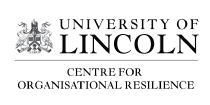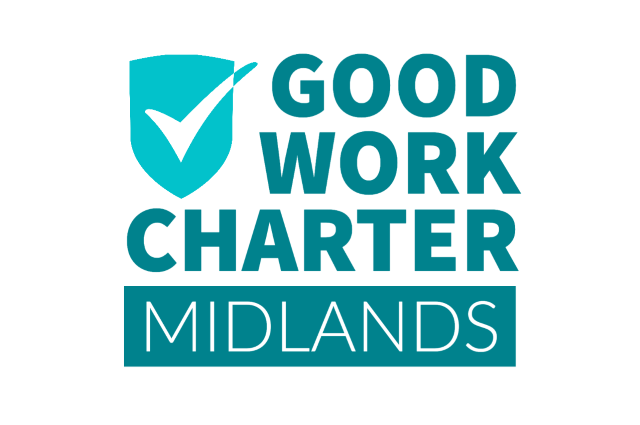Midlands Good Work Charter
Welcome! It gives us great pleasure to introduce the concept of a Good Work Charter to cover the Midlands region. Following on from the successes of similar initiatives in other parts of the UK, Acas has been invited by key collaborative partners to lead the exploration of a Midlands Charter. As such, a working group has been set up to look at the benefits of developing a successful Charter, illustrate potential challenges and evaluate the overall positive contribution this would have for the region.
Progress to date Since 2020, Acas has headed up a group of partners to explore the appetite for, and feasibility of, establishing a Good Work Charter across the region. This has involved representatives of various highly respected bodies - Midlands TUC, CIPD, Make UK, some Chambers of Commerce, various local authorities, academics and academic institutions among them. With discussions across Acas forums for business and trade unions.
The continued commitment from the collaborative partners and growing membership of the group has clearly evidenced the demand for a Charter.
Having drawn on charters already in operation in Wales, the North West, Scotland and London, a draft Charter for the Midlands has now been developed. A copy of the draft Charter can be found in the right side bar.
Why now? The Region currently faces many challenges: - the economic climate; post Brexit and Covid uncertainty; the levelling up agenda, skills shortages and staff recruitment issues and rising fuel costs among many. Acas is eager to help return the region to its rightful place at the centre of the UK economy in terms of business and productivity.
How do we propose to do that? Acas have been leading a project which will help strengthen employment relations, re-invigorate staff engagement and stimulate increased outputs. With the help many other key stakeholders, we have developed a Midlands Good Work Charter.
You may have noticed similar strategies across the United Kingdom notably Wales, Scotland, London and Manchester. We are looking to make an effective, meaningful charter which can confront the economic challenges of our time. Whilst learning from the lessons of our counterparts in other areas of the UK, we can strive to make this the most effective charter it can be and specifically beneficial to the Midlands region from the short through to long term.
Is this the ideal time? Would there ever be a perfect time to launch such a scheme? The economic situation requires considered challenge from stakeholders to minimise its impact. Employers, Trade Unions, trade associations, the Civil Service, LEPS, CIPD, Chambers of Commerce, educational trusts, NHS trust, Universities, local authorities and many others have a role to play and present a robust resilience and confront and defeat economic challenges and the further difficulties they bring. At the same time the Midlands needs to be properly considered in the levelling up agenda. The charter will help with that.
What’s happened up to now? For over 12 months Acas has been running workshops, consultations, discussion group around this question across the Midlands. If you haven’t been involved up to this point now is your opportunity to actively get involved.
What will it bring? For the Midlands region the gains outweigh the possible losses and far outweigh not putting a charter in place at all. Many companies in the local economy are struggling and some have already ceased to exist. The Charter, whilst not providing every answer to all the issues faced in the region can help some organisations to ride out the short-term instability within the current economic climate.
Further into the future, the overall benefits can be more clearly seen. This can only serve to strengthen the local economy and enhance the ability to attract new industries, large companies and meaningful investment into the Midlands and its infrastructure. For the individual organisation, being a charter member could enhance reputation, enable the attraction and retention of talent, foster improved working environments and facilitate better all round economic and workforce health.
There will be a superb knowledge hub to provide information, ideas and inspiration. The hub will allow for networks to exist across business and social communities which are not even considered possible yet. The charter will also allow the exchange of best practice in many spheres. It will allow for a more mutually beneficial and ethical supply chain. It will facilitate a mentoring system to help the less experienced raise standards. It will create a genuine culture of meaningful continuous improvement. It will help make workplaces safer and more attractive places to work. It will inspire innovation and create ways to challenge the skills shortage. It will raise the Midlands’ profile. It will make Midlands’ businesses more productive. It will do whatever we mould it to do!
What are the wider benefits and opportunities of promoting Good Work? The wider arguments for promoting good work in terms of increasing economic sustainability, inward investment and making the Midlands a good place in which to work and do business are well documented. The successful implementation of a Charter would contribute towards Midlands’ workplaces bringing about good physical and mental health as well as providing meaningful work in a positive, inclusive, sustainable environment with businesses who thrive.
Coming out of Covid-19 there is much scope to help those organisations who have struggled to survive as well as assist those who have expanded through this challenging period.
Whether a business is looking to recruit or retain talent, accommodate hybrid working or is considering restructuring, the Charter would provide support, advice and appropriate signposting to partner organisations. Ultimately the final format of the Charter will be agreed in consultation with stakeholders, business leaders and SMEs from across our region.
What are the challenges? The need to fund and resource the Charter is fully recognised by the working group. We are currently developing an inventory of partner commitments in terms of access to direct finance and/or indirect resource provision. Any suggestions, support or sponsorship in this area would be very welcome.
There is a question about where and who should host the permanent website and the knowledge support hub which it is envisaged the Charter will offer. Another challenge is to determine the extent to which the Charter seeks to cover accreditation. Will supporters be held to account to follow the charter? Undoubtedly that may be seen in a negative light and counter-productive by some but desirable by others.
What will the charter bring? There will be a superb knowledge hub to provide information, ideas and inspiration. The hub will allow for networks to exist across business and social communities which are not even considered possible yet. The charter will also allow the exchange of best practice in many spheres. It will allow for a more mutually beneficial and ethical supply chain. It will facilitate a mentoring system to help the less experienced raise standards. It will create a genuine culture of meaningful continuous improvement. It will help make workplaces safer and more attractive places to work. It will inspire innovation and create ways to challenge the skills shortage. It will raise the Midlands’ profile. It will make Midlands’ businesses more productive. It will do whatever we mould it to do!
How can I help shape the Charter? Get involved. Ultimately, the final form, contents and details of the Charter cannot and should not be decided by that working group alone. Deciding on the best way forward needs to be done by collaboration, mutual support and sharing ideas on the best way forward.
Therefore there is scope for you to provide feedback on the draft of the Charter proposal, the opportunity to participate in virtual consultation forums and to get actively involved in the initiative itself.
We want to broaden the base of support amongst key strategic players and those who can give life to the Charter by putting it in to practice, such as large employers and other key public sector institutions.
If your organisation – no matter how large or small - would like to join us in supporting the Charter, to be involved in the consultation or even take part in piloting the Charter, please email us to register your interest or for details about how you might become involved.
Reasons to be cheerfulLink opens in a new window – launching a Midlands Good Work Charter, Professor Chris Warhurst, Director, Warwick institute for Employment Research
Founding working group partners

Acas has a strategic ambition to grow its reach, influence and presence as well as lead debate on the future of work and good practice. By supporting a Charter, by sharing their knowledge and insights, Acas can help to create healthier work, increase productivity and enhance regional prosperity.
Acas is currently chairing the working group, taking a leadership role and it is felt that the independence and impartial reputation of Acas could help this Charter become the first major one without a specific political affiliation, making its appeal more universal.
Organisations already on board with the Charter include:








Background reading
Link to Acas's guidance, training and advisory servicesLink opens in a new window
Links to a few other charters for consideration and contemplation.
The Midlands does not have to replicate these frameworks. There is no exact blue print, that is what makes this such an exciting opportunity!
Fair Work Convention - Scotland
Good Work Standard - London
Greater Manchester Good Employment Charter – Greater Manchester
Good Work Pledge - North Tyne Combined Authority

